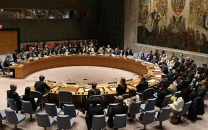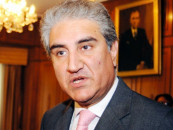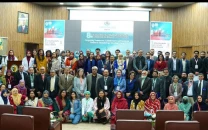Public education should be built on a value system
Challenges to meeting child rights, education, health SDGs highlighted

PHOTO: REUTERS
This was stated by renowned economist Kaiser Bengali during a virtual meeting on ‘Child-Sensitive Budgeting and the Role of Parliament’ on Monday. The meeting had been organised by the Special Committee on Child Rights – CRC of the National Parliamentary Task Force on Sustainable Development Goals (SDGs)
Bengali said that a public education campaign such as the ‘children have to be cared for’ is important to boost enrollment figures as parents send their children to school because of society’s value system for them and not because of any theoretical millennium development goals (MDGs) or SDGs that the country has to meet.
He further suggested that school campuses should be built with up to 300 to 500 students instead of one-room schools. To ensaure attendance, children enrolled in these schools should be transported from their villages.
Apart from educating students, he said that these schools should be a place that monitors and addresses the nutritional needs of students apart from having a clinic. If public schools offer these facilities, parents will send their children to school, as they cannot afford such things.
“These schools will become the centre of fulfilment of children’s basic needs of nutrition and healthcare.
Earlier MNA Mehnaz Akber Aziz, the convenor of the Special Committee on Child Rights of the Parliamentary Task Force on SDGs, said that investing in children is a fundamental prerequisite to providing equal rights to girls and boys, achieving international peace, security and economic development. Within this framework, she said that parliaments have a unique responsibility to guarantee the required human and financial resources for the fulfilment of the rights of every child.
She observed that the successive national and provincial budgets had failed to adequately address children’s issues such as poverty, health, immunization, malnutrition, education or child protection. She panned the allocations in the federal budget for the fiscal year 2020-21, stating that meagre sums were allocated for health and education.
Further analysis of budgetary allocations indicates that allocation for children-specific programmes was 0.74% of the total government expenditure in 2017-18 and less than 1.8% of GDP over past four years.
Published in The Express Tribune, June 16th, 2020.



















COMMENTS
Comments are moderated and generally will be posted if they are on-topic and not abusive.
For more information, please see our Comments FAQ